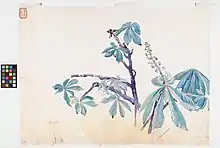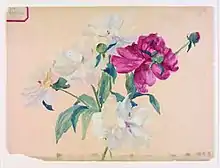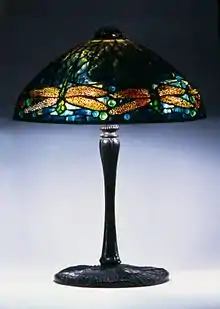Alice Carmen Gouvy
Alice Carmen Gouvy (c.1870-75 - March 27, 1924) was a designer at Tiffany Studios and worked closely with Clara Driscoll, the head of the Women's Glass Cutting Department.
Alice Carmen Gouvy | |
|---|---|
| Born | c.1870-75 |
| Died | 27 March 1924 |
| Education | Cleveland School of Art, Art Students League |
| Known for | Glass, Enamel, Watercolor |
| Movement | Arts and Crafts, Art Nouveau |
.jpg.webp)


Early life and education
Born in Cleveland, Alice Carmen Gouvy was the daughter of Charles P. And Helen L. Gouvy.[1] She graduated from the Cleveland School of Art in 1894.[2] After moving to New York, she shared an apartment with Tiffany Studios designer Clara Driscoll. She studied at the Art Students League from 1896 to 1898. In 1898, she began working at Tiffany studios. She became Driscoll's most trusted assistant, and remained a close friend. The two shared a summer cottage at Point Pleasant, New Jersey.[1]
Career
Gouvy began working at Tiffany Studios in the fall of 1898. That year, Louis C. Tiffany undertook his first experiments with enameling on metals at the Stourbridge Glass Co. facility. Tiffany hired additional staff to create chemicals for the new department. Gouvy was hired to work on formulas and new designs.[3] The department was originally set up in a small laboratory in Tiffany's mansion at 72nd Street and Madison Avenue, and moved to the glass shop at Corona in 1903. By 1900, Gouvy also worked in the Tiffany Studios pottery department and designed bronze objects. In early 1907, Gouvy left Tiffany Studios and returned to Cleveland to work as a schoolteacher while caring for her mother.[1]
Work

The works of Tiffany's artists were rarely identified by name. Gouvy is known to have helped Clara Driscoll and Agnes Northrop to design some of Tiffany's iconic pieces,[4] including the Flying Fish shade, the Deep Sea base,[5] and the Dragonfly lamp.[6] Her sketches are also known to have inspired Tiffany blown glass vases with petal shapes and motifs reminiscent of peonies and marigolds.[7] Many of her works, including Dandelion Plant 95, are inspired by nature.[8]
Major exhibitions
Eight watercolor sketches from Tiffany Furnaces around 1902, painstakingly restored, revealed the signatures of Alice Gouvy and Lillian Palmié. They became the basis for an exhibit at the Rakow Research Library of the Corning Museum of Glass, Tiffany Treasures: Design Drawings by Alice Gouvy and Lillian Palmié, held November 1, 2009 to April 30, 2010.[9] Gouvy's drawings have been described as "lively plant portraits that could be translated to a three-dimensional medium."[10]
Works by Gouvy were also included in the New York Historical Society's traveling exhibition A New Light on Tiffany: Clara Driscoll and the Tiffany Girls which appeared in Munich, Germany and Albuquerque, New Mexico in 2010-2011.[11][12]
Public collections
Her works are included in collections such as the Corning Museum of Glass,[6] the Charles Hosmer Morse Museum of American Art[13] and the Chrysler Museum of Art.[14] Ephemera relating to her work is held in the Art and Artist Files collection at the Smithsonian Libraries.[15]

References
- Eidelberg, Martin; Gray, Nina; Hofer, Margaret K. (2007). A new light on Tiffany : Clara Driscoll and the Tiffany Girls (1st ed.). London: The New-York Historical Society, in association with D. Giles Ltd. p. 171. ISBN 978-1904832355.
- Haverstock, Mary Sayre; Vance, Jeannette Mahoney; Meggitt, Brian L. (2000). Artists in Ohio, 1787-1900 a biographical dictionary. Kent, Ohio: Kent State University Press. p. 345. ISBN 978-1612771946. Retrieved 31 March 2017.
- Zapata, Janet (1993). The jewelry and enamels of Louis Comfort Tiffany. New York: Harry N. Abrams, Inc., Publishers. p. 43. ISBN 978-0810935068.
- Gaffney, Dennis. "Who Were the "Tiffany Girls"?". Antiques Roadshow. PBS. Retrieved 31 March 2017.
- Bassett, Mark (January 1, 2012). "Breaking Tiffany's Glass Ceiling: Clara Wolcott Driscoll (1861-1944)". Cleveland Institute of Art News. Retrieved 31 March 2017.
- "Dragonflies and Water Flowers". Corning Museum of Glass. Retrieved 31 March 2017.
- Kahn, Eve M. (October 29, 2009). "A Touch of History in Handmade Homes". Art & Design. Retrieved 31 March 2017.
- Foster, Kathleen A. (2017). American Watercolor in the Age of Homer and Sargent. Yale University Press. pp. 168–169. ISBN 9780300225891.
- "Tiffany Treasures: Design Drawings by Alice Gouvy and Lillian Palmié". Corning Museum of Glass. Retrieved 31 March 2017.
- Dolbashian, Diane. "Botanica Collected Glass and the Garden". American Society of Botanical Artists. Archived from the original on 27 February 2017. Retrieved 31 March 2017.
- "Dandelion plant 95 [watercolor] [art original]". Corning Museum of Glass. Retrieved 31 March 2017.
- "A New Light on Tiffany: Clara Driscoll and the Tiffany Girls". New York Historical Society Museum & Library. Retrieved 31 March 2017.
- "Celebrating 75 Years: Pathways of American Art at the Morse Museum" (PDF). Morse Museum. Retrieved 31 March 2017.
- "Bowl in Shape of a Tomato with Fruiting Tomato Vine Motif". Chrysler Museum of Art. Archived from the original on 3 July 2016. Retrieved 31 March 2017.
- "Gouvy, Alice Carmen". Smithsonian Libraries. Retrieved 31 March 2017.
External links
- Tiffany Treasures: Design Drawings by Alice Gouvy and Lillian Palmié exhibition at the Corning Museum of Glass, November 1, 2009 to April 30, 2010
- Watercolors from Louis Comfort Tiffany's "Little Arcadia" exhibition at the Charles Hosmer Morse Museum of American Art, opened March 24, 2021 (ongoing)